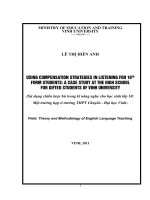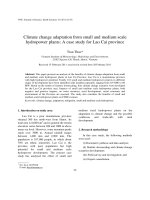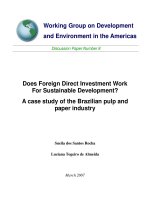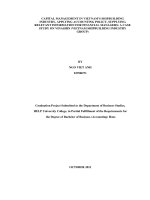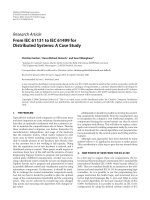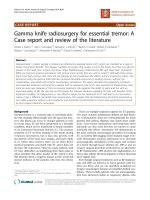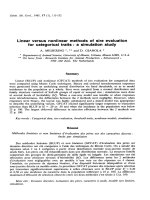Adaptation of CDIO-Based learning outcomes for non-engineering disciplines - A case study of higher educational system in an emerging country
Bạn đang xem bản rút gọn của tài liệu. Xem và tải ngay bản đầy đủ của tài liệu tại đây (267.51 KB, 12 trang )
<span class='text_page_counter'>(1)</span><div class='page_container' data-page=1>
©2007 National Kaohsiung University of Applied Sciences, ISSN 1813-3851
<b>Adaptation of CDIO-Based Learning Outcomes for Non-Engineering </b>
<b>Disciplines: A Case study of Higher Educational System in an Emerging </b>
<b>Country</b>
<b>Dũng Anh VŨ, Nhạ Xuân PHÙNG </b>
1<sub>University of Economics and Business – Vietnam National University, Hanoi </sub>
<b>ABSTRACT </b>
This paper shows how we adapt the CDIO approach in developing learning outcomes or syllabus at the 3rd
(XXX) level of detail, at the conceptual stage, for international economics discipline at University of Economics
and Business – Vietnam National University, Hanoi. Our practice demonstrates that the approach can be
reasonably adapted for other disciplines like economics and business although our conceptual framework of the
learning outcomes needs to be validated in the next steps. The paper also discusses the importance of the CDIO
approach as one of the models in overcoming the challenges to higher education quality improvement in emerging
countries like Vietnam.
<b>INTRODUCTION </b>
Vietnamese higher education has been challenged by its quality issue. At the 2008 conference for higher
education quality organised by the Vietnamese Ministry of Education and Training (MOET), most of the educators
<i>strongly insisted on the need for changing from “the bottom to the top” of the tertiary education system in order to </i>
improve and enhance the quality [Phan, 2008]. The fact is that Vietnam still does not have a single university
whose quality is assessed and accredited by international quality assurance associations (or organisations) up to
<i>the date of 2010. Other researchers point out that “Vietnamese universities are not producing the educated </i>
<i>workforce that Vietnam’s economy and society demand. Surveys conducted by government-linked associations </i>
<i>have found that as many as 50 percent of Vietnamese university graduates are unable to find jobs in their area of </i>
<i>specialization, evidence that the disconnection between classroom and the needs of the market is large. With up to </i>
<i>25 percent of undergraduate curricula devoted to required coursework laden with political indoctrination, it is </i>
<i>little wonder that Vietnamese students are ill-prepared for either professional life or graduate study abroad.” </i>
[Vallely and Wilkinson, 2008]
</div>
<span class='text_page_counter'>(2)</span><div class='page_container' data-page=2>
(just based on their experience). In addition the basic template seems to ignore the competence or capabilities and
practical of students to meet the demands of the society when they leave the institutions for work.
CDIO is an innovative education model. Initially, CDIO was developed for engineering education – “to
educate students who are able to Conceive-Design-Implement-Operate complex, value-added engineering products,
processes and systems in a modern, team-based environment” [Crawley et al., 2007; Crawley, 2002]. This is also
illustrated in the initiative’s three overall goals of educating students who are able to:
<i> “Master a deeper working knowledge of technical fundamentals. </i>
<i> Lead in the creation and operation of new products, processes, and systems. </i>
<i> Understand the importance and strategic impact of research and technological development on society” </i>
[Crawley et al., 2007].
Essentially, it can be understood that the CDIO is an approach that bases upon the society demands (or
outcome-based) to design curriculum. A CDIO-based training programme focuses on building and equipping four
“blocks” of competence (or capabilities) – learning outcomes – for students at the universities: (i) technical
knowledge and reasoning, (ii) personal and professional skills and attributes, (iii) interpersonal skills (teamwork &
<b>communication), and (iv) conceiving, designing, implementing, and operating systems in the enterprise and </b>
societal context [Crawley et al., 2007; Crawley, 2002]. Although this approach has been scientifically and logically
developed, its technical root has caused a strong debate among faculties and educators if the approach could be
cross-applied to other disciplines such as economics and business and this debate has been continued [A series of
seminars, 2009]. This has also undermined the application and adaptation of the CDIO approach to other
disciplines at the institution like ours.
<b>RESEARCH SCOPE AND AIM </b>
The CDIO approach contains a number of elements such as the goals, the vision, the CDIO syllabus or
learning outcomes and student proficiency levels, the CDIO standards etc [4]. In this paper we only concern with
the syllabus or learning outcomes without considering student proficiency levels. In our opinion “student
proficiency levels” is a broad topic and varies depending on the type of the training programmes and the situation
of current practices (e.g. socio-economic condition) in Vietnam. For instance, for the same training programme
there might have different types or levels such as advanced, high-quality, standard, international or domestic ones
in which each of them would require “student proficiency levels” differently. Therefore, we would leave this part
out for another discussion and research.
Within the narrow-down scope this paper aims to adapt the CDIO approach’s learning outcomes template in
developing learning outcomes or syllabus at the 3rd<sub> (XXX) level of detail, at the conceptual stage, for economics </sub>
and business disciplines at University of Economics and Business – Vietnam National University, Hanoi.
<b>RESEARCH QUESTION </b>
</div>
<span class='text_page_counter'>(3)</span><div class='page_container' data-page=3>
<b>REVIEWING THE CDIO APPROACH’S SYLLABUS TEMPLATE </b>
Standard 2 of the CDIO approach sets “specific, detailed learning outcomes for personal and interpersonal
skills, and product, process and system building skills, as well as disciplinary knowledge, consistent with program
goals and validated by program stakeholders” [Crawley et al., 2007, p.49]. “The CDIO syllabus is a list of
knowledge, skills and attitudes rationalized against the norms of contemporary engineering practice,
comprehensive of all known skills lists, and reviewed by experts in many fields” [ibid]. In this light the
CDIO-based learning outcomes consist of four expectations of competence required by stakeholders that an
engineering undergraduate student should possess or achieve when he/she leaves the university – (1) technical
knowledge and reasoning, (2) personal and professional skills and attributes, (3) interpersonal skills, and (4) CDIO
in social and enterprise context (Figure 1). Of these, the first three blocks of competence are the foundation to
create the C-D-I-O (conceive, design, implement and operate) competence for each engineer upon graduation.
<b>Figure 1: CDIO syllabus (at the 1st<sub> level of detail) for engineering discipline </sub></b>
<i>Source: Crawley et al., 2007, p. 51 </i>
The CDIO approach also states that “The principle value of the syllabus is that it can be applied across a
variety of programs and can serve as a model for all programs to derive specific learning outcomes” [ibid].
Therefore, the syllabus was designed to be applicable to any field of engineering in particular and to other
non-engineering fields in general by choosing the words (i.e. terms/norms). As the result of this, the CDIO
syllabus at the first level of detail (X level) for other disciplines can be modified as below (Figure 2):
<b>Figure 2: High-level organisation of the generalised syllabus [4, p.63] </b>
<i>Source: Crawley et al., 2007, p. 63 </i>
<i> Block 1 would geneneralise from “technical knowledge and reasoning” to “disciplinary knowledge and </i>
<i>reasoning”. </i>
<i> Block 2 “personal and professional skills and attributes” and Block 3 “Interpersonal skills: teamwork and </i>
<i>communication” will remain largely unchanged. </i>
<i> Block 4 can be changed from “CDIO in an enterprise and societal context” to “Applying knowledge to benefit </i>
<i>society” although it is difficult to generalise. </i>
The CDIO approach’s learning outcomes for engineering education are also specified at the 3rd<sub> level of detail </sub>
as given in Box 1 below.
<b>4. CDIO</b>
1. Technical Knowledge and
Reasoning 2. Personal & Professional Skills & Attributes
3. Interpersonal
Skills: Teamwork and
Communication
<b>Applying Knowledge to Benefit Society </b>
1. Disciplinary Knowledge and
Reasoning
2. Personal & Professional
</div>
<span class='text_page_counter'>(4)</span><div class='page_container' data-page=4>
<b>Box 1: CDIO syllabus at the 3rd<sub> level of detail for engineering discipline </sub></b>
<b>1 TECHNICAL KNOWLEDGE AND </b>
<b>REASONING </b>
1.1 KNOWLEDGE OF UNDERLYING
SCIENCES
1.2 CORE ENGINEERING FUNDAMENTAL
KNOWLEDGE
1.3 ADVANCED ENGINEERING
FUNDAMENTAL KNOWLEDGE
<b>2 PERSONAL AND PROFESSIONAL SKILLS </b>
<b>AND ATTRIBUTES </b>
2.1 ENGINEERING REASONING AND
PROBLEM SOLVING
<i>2.1.1 Problem Identification and Formulation </i>
<i>2.1.2 Modeling </i>
<i>2.1.3 Estimation and Qualitative Analysis </i>
<i>2.1.4 Analysis With Uncertainty </i>
<i>2.1.5 Solution and Recommendation </i>
2.2 EXPERIMENTATION AND KNOWLEDGE
DISCOVERY
<i>2.2.1 Hypothesis Formulation </i>
<i>2.2.2 Survey of Print and Electronic Literature </i>
<i>2.2.3 Experimental Inquiry </i>
<i>2.2.4 Hypothesis Test, and Defense </i>
2.3 SYSTEM THINKING
<i>2.3.1 Thinking Holistically </i>
<i>2.3.2 Emergence and Interactions in Systems </i>
<i>2.3.3 Prioritization and Focus </i>
<i>2.3.4 Trade-offs, Judgment and Balance in </i>
<i>Resolution </i>
2.4 PERSONAL SKILLS AND ATTRIBUTES
<i>2.4.1 Initiative and Willingness to Take Risks </i>
<i>2.4.2 Perseverance and Flexibility </i>
<i>2.4.3 Creative Thinking </i>
<i>2.4.4 Critical Thinking </i>
<i>2.4.5 Awareness of One’s Personal Knowledge, </i>
<i>Skills, and Attitudes </i>
<i>2.4.6 Curiosity and Lifelong Learning </i>
<i>2.4.7 Time and Resource Management </i>
2.5 PROFESSIONAL SKILLS AND ATTITUDES
<i>2.5.1 Professional Ethics, Integrity, </i>
<i>Responsibility, and Accountability </i>
<i>2.5.2 Professional Behavior </i>
<i>2.5.3 Proactively Planning for One’s Career </i>
<i>2.5.4 Staying Current on World of Engineering </i>
<b>3 INTERPERSONAL SKILLS: TEAMWORK </b>
<b>AND COMMUNICATION </b>
3.1 TEAMWORK
<i>3.1.1 Forming Effective Teams </i>
<i>3.1.2 Team Operation </i>
<i>3.1.3 Team Growth and Evolution </i>
<i>3.1.4 Leadership </i>
<i>3.1.5 Technical Teaming</i>
3.2. COMMUNICATIONS
<i>3.2.1 Communications Strategy </i>
<i>3.2.2 Communications Structure </i>
<i>3.2.3 Written Communication </i>
<i>3.2.4 Electronic/Multimedia Communication </i>
<i>3.2.5 Graphical Communication </i>
<i>3.2.6 Oral Presentation and Inter-Personal </i>
<i>Communications </i>
3.3 COMMUNICATION IN FOREIGN LANGUAGES
<i>3.3.1 English </i>
<i>3.3.2 Languages of Regional Industrial Nations </i>
<i>3.3.3 Other languages </i>
<b>4. CONCEIVING, DESIGNING, IMPLEMENTING, </b>
<b>AND OPERATING SYSTEMS IN THE </b>
<b>ENTERPRISE AND SOCIETAL CONTEXT </b>
4.1 EXTERNAL AND SOCIETAL CONTEXT
<i>4.1.1 Roles and Responsibility of Engineers </i>
<i>4.1.2 The Impact of Engineering on Society </i>
<i>4.1.3 Society’s Regulation of Engineering </i>
<i>4.1.4 The Historical and Cultural Context </i>
<i>4.1.5 Contemporary Issues and Values </i>
<i>4.1.6 Developing a Global Perspective </i>
4.2 ENTERPRISE AND BUSINESS CONTEXT
<i>4.2.1 Appreciating Different Enterprise Cultures </i>
<i>4.2.2 Enterprise Strategy, Goals, and Planning </i>
<i>4.2.3 Technical Entrepreneurship </i>
<i>4.2.4 Working Successfully in Organizations </i>
4.3 CONCEIVING AND ENGINEERING SYSTEMS
<i>4.3.1 Setting System Goals and Requirements </i>
<i>4.3.2 Defining Function, Concept and Architecture </i>
<i>4.3.3 Modeling of System and Insuring Goals Can Be </i>
<i>Met </i>
<i>4.3.4 Development Project Management </i>
4.4 DESIGNING
<i>4.4.1 The Design Process </i>
<i>4.4.2 The Design Process Phasing and Approaches </i>
<i>4.4.3 Utilization of Knowledge in Design </i>
<i>4.4.4 Disciplinary Design </i>
<i>4.4.5 Multidisciplinary Design </i>
<i>4.4.6 Multi-Objective Design (DFX) </i>
4.5 IMPLEMENTING
<i>4.5.1 Designing the Implementation Process </i>
<i>4.5.2 Hardware Manufacturing Process </i>
<i>4.5.3 Software Implementing Process </i>
<i>4.5.4 Hardware Software Integration </i>
<i>4.5.5 Test, Verification, Validation, and Certification </i>
<i>4.5.6 Implementation Management </i>
4.6 OPERATING
<i>4.6.1 Designing and Optimizing Operations </i>
<i>4.6.2 Training and Operations </i>
</div>
<span class='text_page_counter'>(5)</span><div class='page_container' data-page=5>
<b>THE CURRENT LEARNING OUTCOMES FOR ECONOMICS AND BUSINESS </b>
<b>DISCIPLINES AT UNIVERSITY OF ECONOMICS AND BUSINESS – VIETNAM </b>
<b>NATIONAL UNIVERSITY, HANOI </b>
As mentioned earlier the learning outcomes or objectives of any domestic economics and business
undergraduate training programme of Vietnamese tertiary education are guided and bound by a basic template that
contains 4 general components: (i) knowledge, (ii) skills, (iii) competence/capabilities, and (iv)
behaviours/attitudes that the students or learners should achieve. Box 2 provides an example for the programme’s
objectives of the bachelor programme in international economics (honors) at University of Economics and
Business at Vietnam National University, Hanoi. This can be considered as the statement of the learning outcomes
of the programme. It is important to note that other economics and business programmes following the same
template and the same level of description of the contents/details.
<b>Box 2: Current objectives of the bachelor programme in international economics (honors) – University of </b>
<b>Economics and Business at Vietnam National University, Hanoi </b>
The bachelor programme in international economics (honors) is designed to find out and train
undergraduate students who are capable of this field. The programme is given priority in terms of investing
good teaching and learning facilities and qualified and talented lecturers who can apply modern teaching
methods which meet the standards set by the advanced and high-ranked regional universities. Specifically, the
programme is designed towards the following objectives:
<i> Knowledge: the programme aims to equip students systematic and basic knowledge of economics and </i>
international economics, as well as specialised knowledge in the field that approach the modern knowledge of
the region and the world. These ensure that students can develop scientific methods to adapt with the swift
change of the environment. Upon graduation, international economics bachelors would be able to meet the
requirements of possessing good knowledge in the field while being able to promote their creative capacity.
<i> Skills: Students should be able to analyse, synthesise and evaluate the issues of world’s modern economy and </i>
international economics relations and to solve the practical matters of Vietnam’s international economics.
Students are also equipped with professional skills, practical and effective skills such as project planning,
analysis and management skills; international financial analysis skills, professional trading techniques etc.
Upon graduation International economics bachelors would be able to use English proficiently to work and to
communicate with foreign colleagues. They are also able to utilise informatic tools to serve for their
professionals.
<i> Competence/Capabilities: international economics bachelors can work at governmental organisations (e.g. </i>
ministries, sectors, departments), domestic or foreign educational and research institutions, international
organisations, industrial zones, export processing zones, economic zone, domestic enterprises which have
economic relations with foreign partners, joint ventures, foreign representative offices, and foreign
companies in Vietnam. They would also be able to establish their own businesses or to continue their higher
education.
</div>
<span class='text_page_counter'>(6)</span><div class='page_container' data-page=6>
According to our internal quality assurance for the bachelor programme in international economics (honors)
which has been conducted in March 2009 [Internal Quality Assurance Report, 2009], the objectives of the
programme have been built on the basis of referring to comments and contributions of home and foreign experts
and professors. The objectives have also addressed the requirements of knowledge, skills, and attitude in
approaching to standards of regional and international universities which students should achieve. Furthermore,
the objectives have been set in reflecting a partial requirement of employers for whom students work after their
graduation.
However, the objectives or learning outcomes for the bachelor programme at our University in particular and
for other economics and business programmes in Vietnam in general have been stated very unspecific when
compared with the learning outcomes introduced by the CDIO approach (especially at the third level of detail).
Our internal quality assurance report also points out that the objectives or learning outcomes regarding “skills”
mentioned above have been insufficient. More specifically, the training programme has not equipped students a
full set of skills and practical experience in a real working environment in their field of study, so that they could be
more confident to work at home or abroad. The report also suggests us to assess the programme’s curriculum more
often and to organise regular seminars with the participation of employers and students in order to understand
better and to capture new demands of the labour markets and from there to add, adjust or revise periodically the
objectives of the programme to make it more relevant and suitable.
<b>Figure 3: Survey results regarding the learning outcomes of the bachelor programme in international </b>
<b>economics (honors) at University of Economics and Business – Vietnam National University, Hanoi </b>
In our recent survey over 120 employers and other programme’s stakeholders about their requirements for a
bachelor of international economics [Stakeholders Survey Report, 2009], most of them have emphasised on the
necessity and importance of which students should possess professional skills, social skills, and applied and
practical skills apart from their understanding of disciplinary knowledge (Figure 3). This also demonstrates the
insufficience of our current programme’s objectives or learning outcomes. This is also a common situation for
other economics and business undergraduate programmes in Vietnamese tertiary education.
<b>Hình 8. Đề xuất đối với mục tiêu chương trình CLC</b>
72.00%
61.90%
52.50%
83.10%
9.30%
0.00%
10.00%
20.00%
30.00%
40.00%
50.00%
60.00%
70.00%
80.00%
90.00%
Kiến thức
chuyên ngành
Kỹ năng nghề
nghiệp
Kỹ năng xã hội Ứng dụng thực
hành
Khác
</div>
<span class='text_page_counter'>(7)</span><div class='page_container' data-page=7>
<b>ADAPTING THE CDIO APPROACH IN DEVELOPING LEARNING OUTCOMES FOR </b>
<b>INTERNATIONAL ECONOMICS DISCIPLINE AT UNIVERSITY OF ECONOMICS </b>
<b>AND BUSINESS – VIETNAM NATIONAL UNIVERSITY, HANOI </b>
In developing the learning outcomes or syllabus we form a focus group including the following programme’s
stakeholders:
Directorboard of the University (Rector and Vice Rectors).
Dean and Vice Dean of Faculty of International Economics and Business.
Lecturers and staffs of Faculty of International Economics and Business to which the bachelor programme in
international economics (honors) belongs.
Representatives from Training Department of the University.
Professors in the same discipline from other leading home universities and research institutes.
Representatives from employers (companies and organisations mentioned in Box 2).
Representatives from alumni and current students.
Management team of the bachelor programme in international economics (honors).
A representative of Vietnamese education quality expert.
The focus group bases largely on the CDIO approach’s syllabus to develop the learning outcomes for the
international economics discipline [Crawley et al., 2007]. Apart from that the group also refers to a number of
below sources for the employment requirements both inside and outside the country:
Viewpoint about the quality of tertiary education products [Ngoc, 2009].
Model for quality requirements for undergraduate students [Binh, 2000].
Top 10 soft skills for effective living, learning and working [Viet, 2009].
Employability skills - an employer perspective getting what employers want out of the too hard basket
[Australian Chamber of Commerce and Industry, 2002].
Employability skills for the future [Commonwealth of Australia, 2002].
Generic skills of undergraduate students required by Singaporean government [Singaporean government].
Employee appraisal form of PVN (Vietnam Petrolium Corporation) [Vietnam Petrolium Corporation, 2009].
Employee appraisal form of Emerson Network Power (American firm in Vietnam) [Emerson Network Power,
2009].
Employee appraisal form of Eximbank Vietnam (Export-Import Bank of Vietnam) [Export-Import Bank of
Vietnam, 2009].
Employee appraisal form of Canon Vietnam (Japanese firm in Vietnam) [Canon Vietnam Limited, 2009].
The central question that the group concentrates on is “What is the full set of knowledge, skills and attitude
that international economics students should possess as they leave the university?”
<i>The first level of detail (X-level): </i>
At the first level of detail the focus group gets consensus by agreeing the terms used in Figure 2 to apply for
the learning outcomes of the bachelor programme in international economics.
</div>
<span class='text_page_counter'>(8)</span><div class='page_container' data-page=8>
Not only focusing on the professional skills and attributes but also clarifying the role of personal skills and
attributes.
Clarifying and emphasising on interpersonal skills.
Emphasising on practice through training and demanding undergraduate students to be able to apply
knowledge to benefit the society.
<i>The second level of detail (XX-level): </i>
<b>For “disciplinary knowledge and reasoning” block (block 1): our internal quality assurance report [Internal </b>
Quality Assurance Report, 2009] points out the balance and relevance of the 5-knowledge-block structure – (1)
<i>General knowledge, (2) Math and natural sciences, (3) Basic knowledge, (4) Disciplinary fundamental knowledge, </i>
<i>and (5) Disciplinary specialised knowledge. Therefore, the focus group agrees to use this result to develop/build </i>
the learning outcomes at the second level of detail for “disciplinary knowledge and reasoning” block.
<b>For “personal and professional skills and attributes” block (block 2): since several terms are used for </b>
engineering education, the focus group modifies them when applying for the bachelor programme in international
economics:
<i> Section 2.1: “engineering reasoning and problem solving” is changed to “economics or business reasoning </i>
and problem solving”.
<i> Section 2.2: For engineering discipline, knowledge discovery is largely based on experimentation. However, </i>
it is mainly based on (scientific) research for economics and business disciplines. Therefore, the focus group
agrees to change from “experimentation and knowledge discovery” to “research and knowledge discovery”.
<i> Section 2.3: both economics or business and engineering students would need systematic thinking. The focus </i>
group agrees to remain this term.
<i> Section 2.4 and Section 2.5: these can be also applied to economics and business disciplines. Therefore, the </i>
focus group agrees to remain these terms.
<i><b>For “interpersonal skills” block (block 3): all three main contents of this block – teamwork, communication, </b></i>
<i>and communication in foreign languages – can be applied to the economics or business disciplines without any </i>
change. In fact, our programme also pays a great attention in developing English proficiency for students.
<b>For “applying knowledge to benefit society” block (block 4): as the specific objectives of engineering and </b>
economics or business differ (products that an engineer creates are usually tangible such as a computer while it is a
business or economics plan or project for economics/business students), the terms should be specified when
applying for the international economics programme. For instance, for a tangible product like computer, the term
“CDIO” is relevant along its life cycle. However, for an economics or a business plan or project, the “O” in
“Operate” should be changed to “Evaluate”. There is a common aspect between engineering and economics or
business disciplines that “applying knowledge to benefit society” need to be placed in external, societal, enterprise
and business context.
</div>
<span class='text_page_counter'>(9)</span><div class='page_container' data-page=9>
<b>Box 3: Learning outcomes at the 2nd<sub> level of detail for the bachelor programme in international economics </sub></b>
<i>The third level of detail (XXX-level): </i>
At this level of detail block 1 “disciplinary knowledge and reasoning” are not specified further and, therefore,
remain unchanged as the second level of detail. Otherwise, it would become the curriculum of the international
economics programme (with specific subjects).
At the block 2, 3 and 4 the focus group checks item-by-item and agrees the following:
Remaining sub-sections 2.1.1, 2.1.2, 2.1.3, 2.1.4, 2.1.5, 2.2.1, 2.2.2, 2.2.3, 2.2.4, 2.3.1, 2.3.2, 2.3.3, 2.3.4,
2.4.1, 2.4.2, 2.4.3, 2.4.4, 2.4.5, 2.4.6, 2.4.7, 2.5.1, 2.5.2, 2.5.3, 3.1.1, 3.1.2, 3.1.3, 3.1.4, 3.2.1, 3.2.2, 3.2.3,
3.2.4, 3.2.6, 3.3.1, 3.3.3, 4.1.4, 4.1.5, 4.1.6, 4.2.1, 4.2.2, 4.2.4, 4.3.4, 4.4.1, 4.4.2, 4.4.3, 4.4.4, 4.4.5, 4.4.6 of
the engineering syllabus in Box 1 and applying to the international economics programme (Box 4).
Changing the terms of the sub-sections 2.5.4, 4.1.1, 4.1.2, 4.1.3, 4.2.3, 4.3.1, 4.3.2, and 4.3.3 in Box 1 when
applying to the international economics programme (Box 4).
Removing sub-sections 3.1.5, 3.2.5, 3.3.2, 4.5.1, 4.5.2, 4.5.3, 4.5.4, 4.5.5, 4.5.6, 4.6.1, 4.6.2, 4.6.3, 4.6.4,
4.6.5, and 4.6.6 in Box 1 because they are only suitable for engineering education but not for the international
economics programme.
Adding in the contents that are relevant for the economics and business disciplines which are synthesised
from the other sources mentioned earlier. These new sub-sections are 2.1.5, 2.1.6, 2.2.5, 2.2.6, 2.3.5, 2.4.3,
2.4.4, 2.4.5, 2.4.6, 2.4.12, 2.4.13, 2.4.14, 2.4.15, 2.4.16, 2.4.17, 2.5.6, 2.5.7, 2.5.8, 2.5.9, 2.5.10, 2.5.11, 3.1.5,
3.2.5, 3.3.2, 4.5.1, 4.5.2, 4.5.3, 4.6.1, 4.6.2, 4.6.3 và 4.6.4 given in Box 4.
Box 4 synthesises the contents of the learning outcomes for the bachelor programme in international
economics at the third level of detail (XXX-level).
<b>1- DISCIPLINARY KNOWLEDGE AND </b>
<b>REASONING </b>
1.1 GENERAL KNOWLEDGE
1.2 MATH AND NATURAL SCIENCES
1.3 BASIC KNOWLEDGE
1.4 DISCIPLINARY FUNDAMENTAL
KNOWLEDGE
1.5 DISCIPLINARY SPECIALISED
KNOWLEDGE
<b>2- PERSONAL AND PROFESSIONAL SKILLS </b>
<b>AND ATTRIBUTES </b>
2.1 ECONOMICS OR BUSINESS
REASONING AND PROBLEM SOLVING
2.2 RESEARCH AND KNOWLEDGE
DISCOVERY
2.3 SYSTEMATIC THINKING
2.4 PERSONAL SKILLS AND ATTRIBUTES
2.5 PROFESSIONAL SKILLS AND
ATTRIBUTES
<b>3- INTERPERSONAL SKILLS: TEAMWORK </b>
<b>AND COMMUNICATION </b>
3.1 TEAMWORK
3.2 COMMUNICATION
3.3 COMMUNICATION IN FOREIGN
LANGUAGES
<b>4- APPLYING KNOWLEDGE TO BENEFIT </b>
<b>SOCIETY </b>
4.1 EXTERNAL AND SOCIETAL CONTEXT
4.2 ENTERPRISE AND BUSINESS CONTEXT
4.3 CONCEIVING ECONOMICS / BUSINESS
IDEAS
4.4 DESIGNING ECONOMICS / BUSINESS
PLAN / PROJECT
4.5 IMPLEMENT ECONOMICS / BUSINESS
PLAN / PROJECT
</div>
<span class='text_page_counter'>(10)</span><div class='page_container' data-page=10>
<b>Box 4: Learning outcomes at the 3nd<sub> level of detail for the bachelor programme in international economics </sub></b>
<b>1- DISCIPLINARY KNOWLEDGE AND </b>
<b>REASONING </b>
1.1 GENERAL KNOWLEDGE
1.2 MATH AND NATURAL SCIENCES
1.3 BASIC KNOWLEDGE
1.4 DISCIPLINARY FUNDAMENTAL
KNOWLEDGE
1.5 DISCIPLINARY SPECIALISED
KNOWLEDGE
<b>2- PERSONAL & PROFESSIONAL SKILLS & </b>
<b>ATTRIBUTES </b>
2.1 ECONOMICS OR BUSINESS REASONING
& PROBLEM SOLVING
<i>2.1.1 Problem Identification and Formulation </i>
<i>2.1.2 Modeling </i>
<i>2.1.3 Estimation and Qualitative Analysis </i>
<i>2.1.4 Analysis With Uncertainty </i>
<i>2.1.5 Problem analysis using math knowledge </i>
<i>(quantitative) </i>
<i>2.1.6 Problem solving </i>
<i>2.1.7 Solution and Recommendation </i>
2.2 RESEARCH AND KNOWLEDGE
DISCOVERY
<i>2.2.1 Hypothesis Formulation </i>
<i>2.2.2 Survey of Print and Electronic Literature </i>
<i>2.2.3 Experimental Inquiry </i>
<i>2.2.4 Hypothesis Test, and Defense </i>
<i>2.2.5 Application of research in practice </i>
<i>2.2.6 Information collection, analysis and </i>
<i>handling skills </i>
2.3 SYSTEMATIC THINKING
<i>2.3.1 Thinking Holistically </i>
<i>2.3.2 Emergence and Interactions in Systems </i>
<i>2.3.3 Prioritization and Focus </i>
<i>2.3.4 Trade-offs, Judgment and Balance in </i>
<i>Resolution </i>
<i>2.3.5 Multi-perspective analysis / reasoning </i>
2.4 PERSONAL SKILLS AND ATTRIBUTES
<i>2.4.1 Initiative and Willingness to Take Risks </i>
<i>2.4.2 Perserverant / Patient </i>
<i>2.4.3 Flexible </i>
<i>2.4.4 Self-confident </i>
<i>2.4.5 Diligent / hard working </i>
<i>2.4.6 Enthusiasm and passion for career </i>
<i>2.4.7 Creative Thinking </i>
<i>2.4.8 Critical Thinking </i>
<i>2.4.9 Awareness of One’s Personal Knowledge, </i>
<i>Skills, and Attitudes </i>
<i>2.4.10 Curiosity and Lifelong Learning </i>
<i>2.4.11 Time and Resource Management </i>
<i>2.4.12 Adaptability to complicated real situations </i>
<i>2.4.13 Cross-cultural savvy </i>
<i>2.4.14 Self-esteem </i>
<i>2.4.15 Learning and self-learning skills </i>
<i>2.4.16 Self-management skills </i>
<i>2.4.17 Computer skills </i>
2.5 PROFESSIONAL SKILLS AND
ATTRIBUTES
<i>2.5.1 Professional Ethics, Integrity, </i>
<i>Responsibility, and Accountability </i>
<i>2.5.2 Professional Behavior </i>
<i>2.5.3 Proactively Planning for One’s Career </i>
<i>2.5.4 Task organisation and arrangement skills </i>
<i>2.5.5 Awareness & catch up with modern world’s </i>
<i>economy </i>
<i>2.5.6 Ability to work independently </i>
<i>2.5.7 Self-confidence in international working </i>
<i>environment </i>
<i>2.5.8 Ability to set objectives </i>
<i>2.5.9 Ability to self-motivate at work </i>
<i>2.5.10 Ability to develop and promote personal & </i>
<i>career </i>
<i>2.5.11 Customer and partner care skills </i>
<b>3- INTERPERSONAL SKILLS: TEAMWORK AND </b>
<b>COMMUNICATION </b>
3.1 TEAMWORK
<i><b>3.1.1 Forming Effective Teams </b></i>
<i>3.1.2 Team Operation </i>
<i>3.1.3 Team Growth and Evolution </i>
<i>3.1.4 Leadership </i>
<i>3.1.5 Ability to work with different teams </i>
3.2 COMMUNICATION
<i>3.2.1 Communications Strategy </i>
<i>3.2.2 Communications Structure (argument, idea </i>
<i>arrangement...) </i>
<i>3.2.3 Written Communication </i>
<i>3.2.4 Electronic/Multimedia Communications </i>
<i>3.2.5 Presentation </i>
<i>3.2.6 Oral Inter-Personal Communications </i>
3.3 COMMUNICATION IN FOREIGN LANGUAGES
<i>3.3.1 English – listenting and speaking </i>
<i>3.3.2 English – reading and writing </i>
<i>3.3.3 Other languages </i>
<b>4- APPLYING KNOWLEDGE TO BENEFIT </b>
<b>SOCIETY </b>
4.1 EXTERNAL AND SOCIETAL CONTEXT
<i><b>4.1.1 Roles and responsibility of bachelors </b></i>
<i>4.1.2 The Impact of economics/business on Society </i>
<i>4.1.3 Society’s Regulation of economics/business </i>
<i>4.1.4 The Historical and Cultural Context </i>
<i>4.1.5 Contemporary Issues and Values </i>
<i>4.1.6 Developing a Global Perspective </i>
4.2 ENTERPRISE AND BUSINESS CONTEXT
<i>4.2.1 Appreciating Different Enterprise Cultures </i>
<i>4.2.2 Enterprise Strategy, Goals, and Planning </i>
<i>4.2.3 Entrepreneurship and relationship between </i>
<i>enterprises and international economics issues </i>
<i>4.2.4 Working Successfully in Organizations </i>
4.3 CONCEIVING ECONOMICS / BUSINESS
IDEAS
<i>4.3.1 Set up economics/business objectives (based on </i>
<i>the market need and societal context) </i>
<i>4.3.2 Basic definitions, concepts, theories as </i>
<i>foundation </i>
<i>4.3.3 Modeling of ideas and insuring goals can be met </i>
<i>4.3.4 Development Project Management (risks, </i>
<i>feasibility, costs, resources…) </i>
4.4 DESIGNING ECONOMICS / BUSINESS PLAN /
PROJECT
<i>4.4.1 Plan/project designing process (implementing </i>
<i>conditions…) </i>
<i>4.4.2 Plan’s or project’s approach (approach methods, </i>
<i>steps...) </i>
<i>4.4.3 Utilisation of knowledge in designing </i>
<i>plan/project </i>
<i>4.4.4 Disciplinary plan/project design (tools, methods </i>
<i>and relevant process…) </i>
<i>4.4.5 Multi-disciplinary plan/project design </i>
<i>(relationships among tools, methods and </i>
<i>processes…) </i>
<i>4.4.6 Multi-objective plan/project design (designing </i>
<i>implementation plan, testing, environmental </i>
<i>factors, reliability …) </i>
4.5 IMPLEMENTING ECONOMICS / BUSINESS
PLAN / PROJECT
<i>4.5.1 Training/coaching to implementing plan/project </i>
<i>4.5.2 Selecting resources for implementing </i>
<i>plan/project </i>
<i>4.5.3 Organising the implementation of plan/project </i>
<i>4.6 EVALUATE ECONOMICS / BUSINESS PLAN / </i>
<i>PROJECT </i>
<i>4.6.1 Designing standards/criteria to evaluate </i>
<i>performance / outcomes </i>
<i>4.6.2 Evaluating performance/outcomes (economic - </i>
<i>social – environmental…) </i>
</div>
<span class='text_page_counter'>(11)</span><div class='page_container' data-page=11>
<b>FUTURE WORKS </b>
The syllabus with the codified learning outcomes for the bachelor programme in international economics is
developed at the conceptual level. In order to validate this conceptual framework we plan the following future
works following the CDIO approach:
Conducting a wide survey over the stakeholders of the programme: employers, lecturers from University of
Economics and Business – Vietnam National University, Hanoi and from other universities, the University’s
management team and staff, current students, alumni, and experts in the field of international economics.
Feedbacks from the stakeholders will be taken into careful consideration and used to revise the conceptual
framework of the syllabus with the approval by the University’s and the programme’s lecturers.
Organising seminars on the revised conceptual framework with the participation of the representatives of
each group of the programme’s stakeholders. The seminars’ outcomes will help us to make further revisions
(if any) to the syllabus and, thereafter, complete the final syllabus with codified learning outcomes of the
programme.
<b>DISCUSSIONS AND CONCLUSIONS </b>
In extending the result of this paper two important aspects are further discussed: (1) possible adoption of the
international economics programme’s CDIO-based syllabus for other economics and business disciplines and (2)
the importance of the CDIO approach for enhancing the quality of tertiary education in emerging countries like
Vietnam.
In our opinion the developed conceptual framework/syllabus can be reasonably used for other economics and
business disciplines. When developing the syllabus we have taken into consideration the fact that students who
graduate from our programme have a wide range of choices for their future career as they can work for both
business and economics environments (as mentioned in Box 2). The learning outcomes for both economics and
business are, therefore, generalised and integrated into the syllabus. However, there might be an argument about
the differences of the learning outcomes among those economics and business disciplines or among sub- or
minor-disciplines within economics and business domains.
In fact the differences mainly exist in the block 1 (disciplinary knowledge and reasoning) and block 4
(applying knowledge to benefit society) while block 2 (personal and professional skills and attributes) and block 3
(interpersonal skills) are largely transferable among various disciplines. For instance, the knowledge required for
international economics and business disciplines are different. In addition, although both economics and business
students adopt the same approach or method in applying knowledge to benefit society (i.e. the cycle of
conceiving-designing-implementing-evaluating business plan/project), the context and objectives are also quite
different. When adopting or adapting the framework, business or economics programmes should take these into
account.
</div>
<span class='text_page_counter'>(12)</span><div class='page_container' data-page=12>
economics programme’s CDIO-based syllabus) illustrates the usefulness and adaptability of the CDIO approach in
this matter, as well as provides either a useful case or a general template of the outcome-based syllabus for other
economics and business disciplines.
<b>KEYWORDS </b>
CDIO Approach, Learning Outcomes, Syllabus, Education Quality, Higher/Tertiary Education, International
Economics
<b>REFERENCES </b>
[1] Australian Chamber of Commerce and Industry, Employability skills - an employer perspective getting what employers
want out of the too hard basket, 2002.
[2] A series of seminars on the CDIO approach organised by University of Economics and Business – Vietnam National
University, Hanoi, June – December 2009.
[3] Canon Vietnam Limited, Employee appraisal form, 2009.
[4] Commonwealth of Australia, Employability skills for the future, 2002.
[5] Crawley, E., “Creating the CDIO Syllabus: A Universal Template for Engineering Education”, MIT, 2002.
[6] Crawley, E., Malmqvist, J., Ostlund, S. and Brodeur, D., Rethinking Engineering Education: the CDIO Approach,
Springer, 2007, New York.
[7] Binh, N.V., “Model for quality requirements for undergraduate students”, Tertiary education quality assurance conference,
Da Lat, Vietnam, 2000.
[8] Emerson Network Power, Employee appraisal form, 2009.
[9] Export-Import Bank of Vietnam (Eximbank), Employee appraisal form, 2009.
[10] Internal Quality Assurance Report for the bachelor programme in international economics (honors) at University of
Economics and Business – Vietnam National University, Hanoi, March 2009.
[11] MOET (Ministry of Education and Training), Notice: Conclusions of the Deputy Prime Minister cum the Minister of
MOET at the national conference on higher education quality, No. 1007/TB-BGDĐT, 2008.
[12] Ngoc, D.L., “Viewpoint about the quality of tertiary education products”, Tertiary education and quality of tertiary
education conference, University of Economics and Business – Vietnam National University, Hanoi, September 2009.
[13] Phan, N., “Higher Education Quality: Innovate from the Bottom to the Top”, TuoiTre Online, 2008.
[14] Singaporean government, Generic skills of undergraduate students required by Singaporean government.
[15] Stakeholders Survey Report for the bachelor programme in international economics (honors) at University of Economics
and Business – Vietnam National University, Hanoi, September-December 2009.
[16] Vallely, T.J. and Wilkinson, B., “Vietnamese Higher Education: Crisis and Response”, Memorandum: Higher Education
Task Force, Harvard Kennedy School, November 2008.
</div>
<!--links-->
